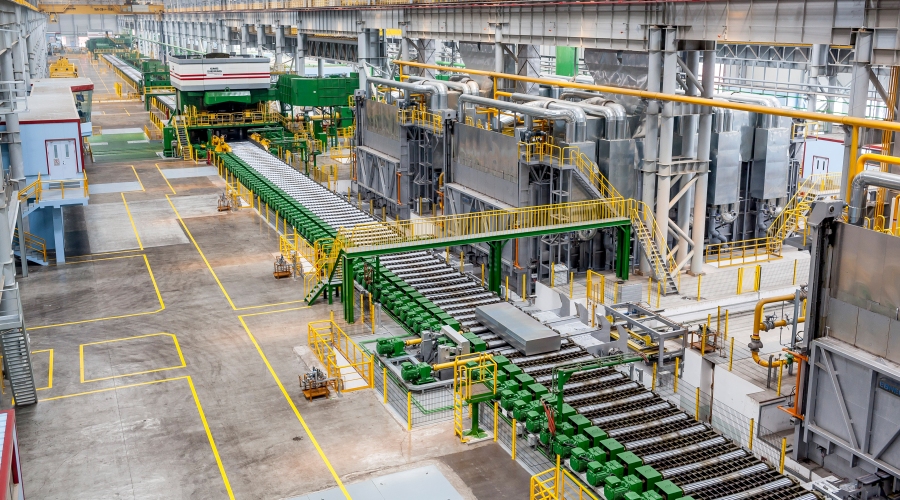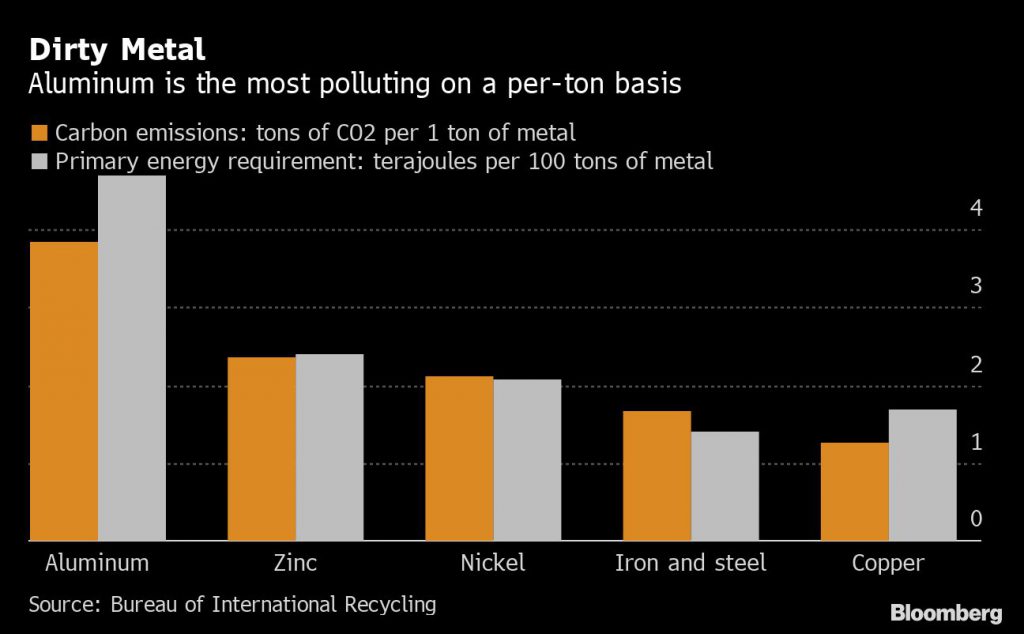Green aluminum, coming soon to a metals-trading desk near you

Aluminum and the climate movement have a complicated relationship. The lightweight metal used in cars, airplanes and drinks cans is touted as a green alternative, yet it’s the most carbon-intensive industrial metal to produce.
As investors and consumers zero in on polluting industries, and pressure intensifies on manufacturers to source materials responsibly, the aluminum industry may be headed for a schism, with the potential for a separate, premium market in metal that claims “clean” status.
Aluminum does tick several green boxes: it’s lighter than steel — which means it makes fuel-efficient cars — and is easily recyclable. But it requires massive amounts of power to produce. For much of the world’s metal, that energy comes from coal. Globally, aluminum production contributes 4% of emissions.
But not all metal is made equal. A handful of producers including United Co. Rusal, Norsk Hydro ASA and Rio Tinto Group run most or all of their smelters using hydropower, dramatically reducing the impact on the environment. Rio has been seeking to push the advantage for years, and has supply deals with Nespresso and Apple Inc. linked to the sustainability of its metal.

Some commodities traders are already positioning themselves for a shift. Trafigura Group has set up a dedicated green-aluminum trading desk, betting that climate pressure will revolutionize the aluminum industry by splitting it in two. Metals trader Concord Resources Ltd. is also pushing into green aluminum, said CEO Mark Hansen.
“Five years ago there was very little discussion or care about the power source of the aluminum smelter,” said Hansen. “Today it is becoming very loud and very relevant.”
The moves come at an interesting time for the aluminum industry, which is emerging from the turmoil unleashed last year by the U.S. sanctions on Rusal. One of the market’s biggest supply contracts — a multiyear deal for Rusal to sell large amounts to Glencore Plc — has recently ended.
From now on, Rusal is likely to sell its metal on a shorter-term, arms-length basis, according to Greg Barker, chairman of En+ Group International PJSC, the London-listed holding company for Rusal and the Russian hydroelectric and gas power assets that supply it.
The Russian producer has been one of the more vocal advocates for the development of a green aluminum market. The fact that it will have a lot more metal to place may provide the company with an opportunity to flex its muscles with buyers as it lobbies for a ‘clean’ premium.
“If the aluminum sector was a country, it would be larger than Germany in terms of its emissions”
For Barker, the industry needs a “wake-up call” to focus to cutting its carbon emissions, he said in an interview.
“You’ve got people literally screaming in the streets demanding a step change,” Barker said. “I think the sector is on the wrong side of history.”
To be sure, producers of lower-carbon aluminum face the headwind of sagging prices and demand for the metal, with buyers reluctant to pay more while the broader market is awash with metal.
In the meanwhile, one opportunity for Trafigura’s traders might involve tapping green finance lines to store metal cheaply while demand for green aluminum grows, said Philippe Mueller, head of aluminum and alumina trading.
“Ideally, you would go to a producer of green, low-carbon aluminum and you structure a financing solution for that producer, working with the green financing team of a bank, and then you have a long-term offtake,” he said. “Later you provide that flow to a customer, and you provide payment terms that are linked to things like their recycling rate, for example.”
Concord Resources’s Hansen says he sees a battle between east and west when it comes to aluminum, with the listed companies actively promoting sustainable supply chains diverging from Chinese producers that use coal power.
Even so, change is coming to the Chinese market too. The country’s powerhouse producers have made major strides in improving energy efficiency, and the country’s Yunnan province is emerging as a major hub for aluminum produced from hydropower, according to Trafigura’s Mueller.
“If the aluminum sector was a country, it would be larger than Germany in terms of its emissions,” En+’s Barker said. “We got to face up to our responsibility.”
(By Mark Burton, Thomas Biesheuvel and Jack Farchy)
{{ commodity.name }}
{{ post.title }}
{{ post.date }}




Comments